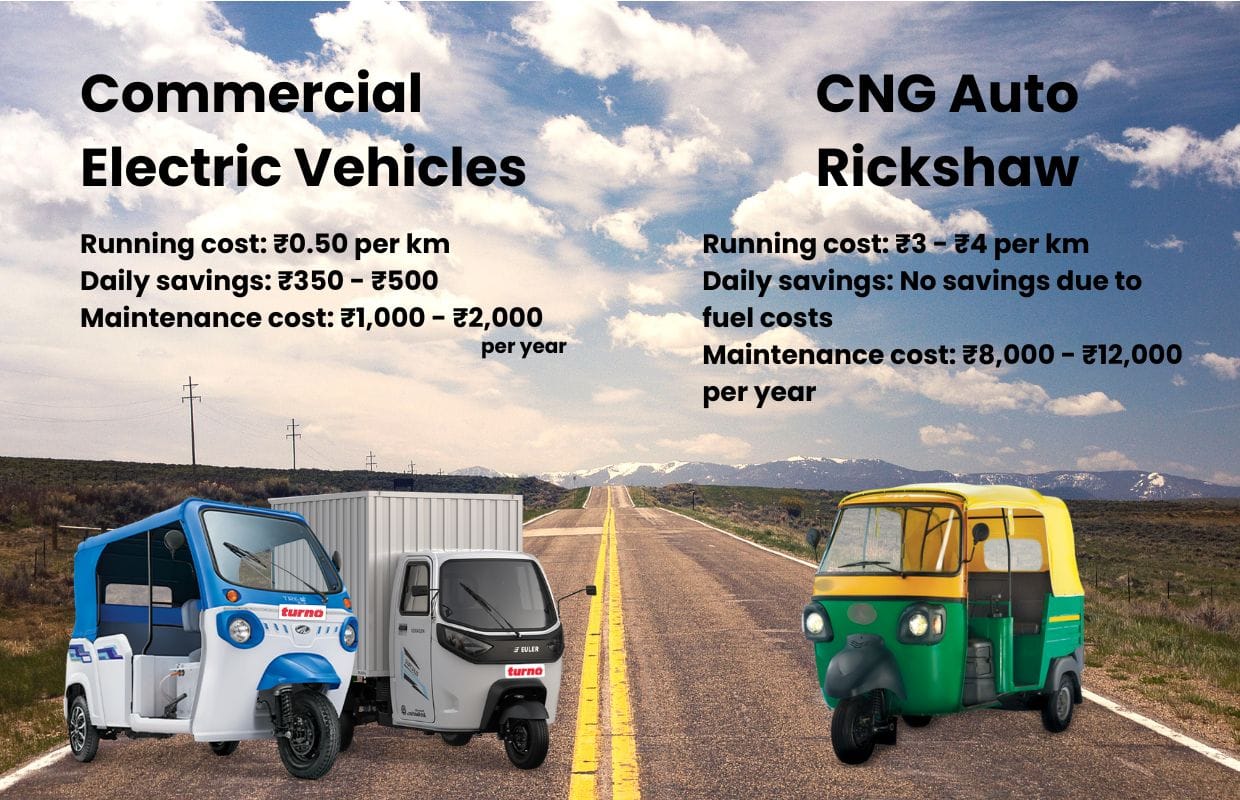Electric commercial vehicles have risen as a promising remedy for enterprises aiming to expand while keeping their carbon impact in check. Regardless of weather conditions, be it rainy or sunny, these goods electric vehicles (EVs) come with a host of benefits, particularly accentuated during monsoons, establishing them as an intelligent preference for businesses not only in India but also on an international scale.

The Rise of Electric Commercial Vehicles
The spotlight on electric commercial vehicles, encompassing electric trucks, has intensified due to their eco-friendly and noiseless operation, economical operational expenditures, and minimized ecological repercussions. India, a nation experiencing rapid urban growth and a heightened need for efficient goods transportation, is strategically poised to reap substantial rewards from integrating electric commercial vehicles into its fleet.
Easy Charging for Seamless Operations
A pivotal concern for businesses deliberating the adoption of electric commercial vehicles centers around the availability of charging infrastructure. Nonetheless, progress in technology has spurred the creation of effective charging remedies. As India's charging station network expands, enterprises can seamlessly incorporate EVs into their operations. Moreover, numerous electric vehicle manufacturers offer rapid-charging alternatives, allowing businesses to recharge their vehicles swiftly during brief intervals or while engaged in tasks like loading and unloading cargo.
Rainproof and Waterproof Vehicles for All-Weather Reliability
One of the challenges faced by traditional vehicles, especially during monsoons, is water damage. Electric commercial vehicles are designed with waterproofing measures in mind. These vehicles feature sealed components, water-resistant wiring, and protective enclosures for crucial components such as batteries and electronics. This design ensures that the vehicles can operate seamlessly even during heavy rainfall, enhancing their reliability and longevity.
IP67 Rated Batteries for Enhanced Durability
Electric commercial vehicles are equipped with advanced battery technology, often boasting IP67 ratings. This rating indicates that the batteries are dustproof and can withstand immersion in water up to one meter deep for 30 minutes. IP67 rated batteries are well-suited for monsoon conditions, offering enhanced durability and protection against water-related damage. This feature ensures that businesses can continue their operations without disruptions caused by inclement weather.
Advantages Over Diesel Vehicles During Monsoon
When the monsoon season arrives, the advantages of electric commercial vehicles over their diesel counterparts become even more pronounced:
Waterproof Design
The rainproof construction of electric commercial vehicles ensures that critical components are protected from water damage, minimizing downtime due to weather-related issues. Diesel vehicles, on the other hand, are vulnerable to water infiltration, leading to engine and electrical problems.
Instant Torque
Electric motors deliver instant torque, providing smooth and controlled acceleration even on wet and slippery roads. This feature is particularly advantageous during the monsoon season when road conditions can be challenging for vehicles with traditional combustion engines.
Lower Maintenance
Electric commercial vehicles have fewer moving parts compared to their diesel counterparts. This results in reduced wear and tear, translating to lower maintenance requirements. Diesel vehicles, with their complex engines and drivetrains, often require more frequent servicing, especially after exposure to harsh weather conditions.
Reduced Noise
The quiet operation of electric vehicles is well-suited for urban environments where noise pollution is a concern. During monsoons, the tranquility offered by electric commercial vehicles can be especially appreciated, as it contributes to a more pleasant and peaceful urban atmosphere compared to the noise generated by diesel engines.
Environmental Impact
Electric vehicles produce zero tailpipe emissions, reducing the overall pollution in urban areas. Monsoons can exacerbate air quality issues, but businesses that operate electric commercial vehicles contribute to cleaner air and a healthier environment for city dwellers.
Cost Savings
The operational expenses associated with electric commercial vehicles are usually lower in comparison to those of diesel vehicles. Electricity costs are generally more economical than diesel fuel, and electric vehicles boast simpler mechanics with fewer components requiring maintenance. Considering that fuel expenses often surge during the monsoon period due to disruptions in supply chains, businesses that opt for electric vehicles can experience enhanced stability and predictability in their operational costs.
Regenerative Braking
Frequently, electric commercial vehicles incorporate regenerative braking systems that capture and transform kinetic energy into battery power while braking. This not only enhances the vehicle's overall efficiency but also contributes to better vehicular control, particularly on damp and slippery road conditions.
Long-term Savings
Governments and local authorities often offer incentives and tax benefits to encourage the adoption of electric vehicles. These incentives can significantly offset the initial investment costs of electric commercial vehicles, making them even more attractive for businesses. Diesel vehicles, on the other hand, might lack such incentives and can face stricter regulations as environmental concerns mount.
Conclusion
Electric commercial vehicles present a compelling opportunity for businesses to grow sustainably while addressing the challenges posed by monsoons. Their waterproof design, IP67 rated batteries, and easy charging options make them well-suited for all-weather operation. When compared to diesel vehicles, electric commercial vehicles offer several advantages that are especially pronounced during the monsoon season. As charging infrastructure continues to improve and technology advances, adopting electric commercial vehicles becomes a strategic move for businesses looking to thrive in a changing economic and environmental landscape. Rain or shine, embracing electric commercial vehicles is a step towards a brighter, cleaner future for businesses and the planet alike.

1. How do electric commercial vehicles contribute to sustainable growth?
Electric commercial vehicles are eco-friendly alternatives to traditional diesel vehicles, producing zero tailpipe emissions and reducing air pollution. By adopting these vehicles, businesses can grow sustainably while minimizing their carbon footprint.
2. Are charging stations easily accessible for electric commercial vehicles?
Yes, charging infrastructure for electric vehicles is rapidly expanding. With a growing network of charging stations across India, businesses have convenient access to places where they can recharge their electric commercial vehicles, facilitating their integration into operations.
3. How do electric commercial vehicles perform during monsoons?
Electric commercial vehicles are designed with waterproofing measures, IP67 rated batteries, and instant torque, making them well-equipped to handle rainy conditions. Their regenerative braking systems also contribute to better control on wet and slippery roads.
4. How do electric commercial vehicles save on operational costs?
Electric vehicles typically have lower operational costs compared to diesel vehicles. Electricity is cheaper than diesel fuel, and these vehicles have fewer moving parts, leading to reduced maintenance requirements and more predictable operating costs.
5. What advantages do electric commercial vehicles offer over diesel vehicles during the monsoon season?
Electric commercial vehicles provide advantages such as waterproof design, instant torque for better acceleration on wet roads, lower maintenance needs, reduced noise pollution, and substantial environmental benefits due to zero tailpipe emissions, all of which contribute to a more reliable and cost-effective operation during monsoons.



